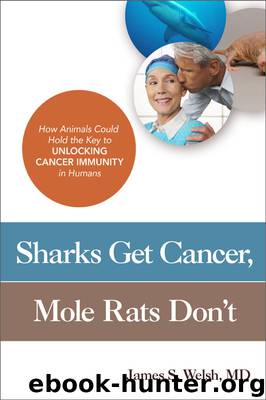Sharks Get Cancer, Mole Rats Don't by James S. Welsh MD

Author:James S. Welsh, MD
Language: eng
Format: epub
ISBN: 9781633881556
Publisher: Prometheus Books
Published: 2016-03-03T16:00:00+00:00
Population, when unchecked, increases in a geometric ratio. Subsistence increases only in an arithmetic ratio. A slight acquaintance with numbers will show the immensity of the first power in comparison to the second.
—Thomas Robert Malthus, An Essay on the Principles of Population
Cells ordinarily organize themselves into recognizable tissues, which in turn organize themselves into clearly identifiable organs. For example, hepatic cells organize themselves into discrete and identifiable liver tissue, and liver tissues in turn amass themselves into a clearly defined organ—the liver. Similarly, in a highly concerted fashion, various cells will arrange themselves into cardiac tissues, which organize themselves into a clearly defined organ—the heart. All the cells that make up these organs and tissues must interact with each other in an intricate and coordinated fashion to permit proper function. For example, cardiac muscle cells must work in perfect harmony to permit synchronized beating and pumping of blood. Disruption of this harmony, as in a cardiac arrhythmia, leads to uncoordinated, dysfunctional heart beating and possible death.
All cells in the human body are expected to collaborate with one another and respect each other's boundaries. Normal cells show respect for each other, not crowding each other or encroaching on one another's territories. For instance, kidney cells remain organized into kidney tissue and remain confined to the paired organs in the back just under the lowest ribs. Cooperating with each other and their neighbors, they remain content in their designated position and don't invade the nearby muscles, ribs, liver, or pancreas.
From this perspective, cancer is a cellular disease.1 It is the inevitable final result of the gross violation of the one basic principle all cells should abide by: cooperation. Unlike the highly orchestrated and constructive behavior of normal cells, cancer cells ditch the concept of cooperation and choose to compete. They compete with each other, and they compete with normal cells. In any biological system, whether individual cells or organisms in a large population, where there is competition there is natural selection. And where there is natural selection there is evolution. In fact, NASA once went so far as defining life as “a self-sustaining chemical system capable of Darwinian evolution,” underscoring the inextricable link between life, competition, and evolution.
In a population of predators competing for prey, over time there will emerge faster, stealthier, stronger, and craftier predators as they compete amongst themselves. To counter these upgrades, increasingly agile, more effectively camouflaged, more heavily armored prey will survive and predominate. Survival of the fittest. This outcome of constant competition seems intuitively obvious and is the basis for Darwinian evolution by natural selection.
Individual cells within tissues or organs are not supposed to compete. For the sake of the entire organism, they must all cooperate in a collaborative, peaceful, respectful manner. In this regard, a cancer cell is a rogue cell. Thus, cancer as a disease is characterized by a bastion of competitive, uncooperative, self-centered rogue cells. This is why cancer is considered a cellular disease. Cancer cells do not look out for the body as a whole.
Download
This site does not store any files on its server. We only index and link to content provided by other sites. Please contact the content providers to delete copyright contents if any and email us, we'll remove relevant links or contents immediately.
Men In Love by Nancy Friday(5231)
Everything Happens for a Reason by Kate Bowler(4729)
The Immortal Life of Henrietta Lacks by Rebecca Skloot(4571)
Why We Sleep by Matthew Walker(4432)
The Sports Rules Book by Human Kinetics(4377)
Not a Diet Book by James Smith(3409)
The Emperor of All Maladies: A Biography of Cancer by Siddhartha Mukherjee(3142)
Sapiens and Homo Deus by Yuval Noah Harari(3061)
Day by Elie Wiesel(2779)
Angels in America by Tony Kushner(2648)
A Burst of Light by Audre Lorde(2597)
Endless Forms Most Beautiful by Sean B. Carroll(2471)
Hashimoto's Protocol by Izabella Wentz PharmD(2371)
Dirty Genes by Ben Lynch(2313)
Reservoir 13 by Jon McGregor(2300)
Wonder by R J Palacio(2202)
And the Band Played On by Randy Shilts(2188)
The Immune System Recovery Plan by Susan Blum(2056)
Stretching to Stay Young by Jessica Matthews(2036)
